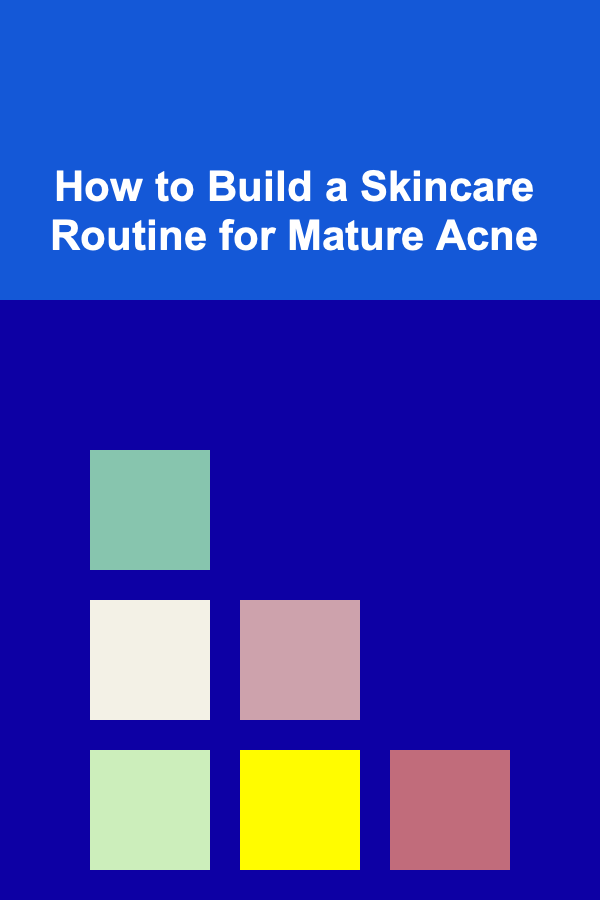
How to Build a Skincare Routine for Mature Acne
ebook include PDF & Audio bundle (Micro Guide)
$12.99$6.99
Limited Time Offer! Order within the next:

Mature acne, often referred to as adult acne, is a persistent issue for many individuals as they age. While acne is typically associated with adolescence, it can affect individuals well into their 30s, 40s, and beyond. In fact, hormonal changes, lifestyle factors, and environmental influences can all contribute to the development of acne in mature skin. The unique combination of aging skin and acne calls for a thoughtful, tailored skincare routine that addresses both concerns.
In this article, we will delve into the essential components of building an effective skincare routine for mature acne. We will focus on understanding the causes of mature acne, the importance of different skincare steps, and how to select products that promote both acne healing and skin aging.
Understanding Mature Acne
The Causes of Mature Acne
Acne in mature individuals can develop for a variety of reasons. Unlike the acne that occurs during adolescence, which is often linked to puberty and excess oil production, mature acne typically has different underlying causes. These include:
- Hormonal Changes: Hormonal fluctuations, particularly during perimenopause and menopause, can lead to acne outbreaks. Changes in estrogen and progesterone levels can affect sebum production and lead to clogged pores.
- Stress: High levels of stress trigger the release of cortisol, which can stimulate sebaceous glands to produce more oil. This excess oil can clog pores and lead to breakouts.
- Diet: Certain foods like dairy, sugar, and refined carbohydrates can contribute to the development of acne by increasing inflammation in the body.
- Medication: Some medications, such as corticosteroids and birth control pills, can trigger acne flare-ups.
- Environmental Factors: Pollutants, harsh weather conditions, and exposure to environmental stressors can cause skin inflammation and clog pores.
- Aging Skin: As we age, our skin's natural ability to produce collagen and shed dead skin cells slows down, leading to dull, uneven texture. When combined with acne, this can exacerbate the problem, as dead skin cells can clog pores, trapping bacteria and oil.
Key Challenges in Dealing with Mature Acne
Mature acne presents a unique set of challenges compared to teenage acne. These challenges include:
- Drier Skin: As we age, the skin loses moisture and becomes drier. This makes it more difficult to treat acne without further irritating the skin. Harsh acne treatments can strip the skin of moisture, causing dryness, flakiness, and irritation.
- Thinner Skin: Aging skin is thinner and more sensitive. The delicate skin may react more severely to active ingredients, making it necessary to carefully choose products that address acne while being gentle on the skin.
- Hyperpigmentation: Post-inflammatory hyperpigmentation (PIH) is common in mature acne. Dark spots left behind after acne heals can be harder to treat in older skin, requiring additional attention.
- Slower Healing Process: The natural healing process slows down with age, meaning breakouts may last longer and take more time to clear up.
Steps to Building a Skincare Routine for Mature Acne
A balanced skincare routine that targets both acne and the signs of aging can improve the appearance of mature skin, minimize breakouts, and promote overall skin health. The key is to use products that are effective without being too harsh, allowing for healing while maintaining the skin's moisture balance. Let's explore the key steps in creating a skincare routine for mature acne:
1. Cleansing
A gentle yet effective cleanser is the cornerstone of any skincare routine. Cleansing helps to remove dirt, oil, and impurities from the skin while preventing clogged pores.
Why It's Important for Mature Acne: Acne develops when excess oil, dead skin cells, and bacteria clog the pores. Cleansing removes these impurities, reducing the risk of breakouts. However, since mature skin tends to be drier, it's important to choose a non-stripping, hydrating cleanser that won't compromise the skin's moisture balance.
What to Look For in a Cleanser:
- Hydrating Ingredients: Opt for cleansers with hydrating ingredients like glycerin, hyaluronic acid, and ceramides, which help to restore moisture to the skin.
- Non-comedogenic: Choose a cleanser that is labeled non-comedogenic to avoid clogging pores.
- Gentle Formulation: Look for a gentle, sulfate-free formula that won't strip your skin of its natural oils.
Recommended Products:
- CeraVe Hydrating Cleanser
- La Roche-Posay Toleriane Hydrating Gentle Cleanser
2. Exfoliation
Exfoliating your skin helps to remove dead skin cells and promote cell turnover. This is particularly important for mature skin, as the natural exfoliation process slows down with age.
Why It's Important for Mature Acne:
- Prevents Clogged Pores: By removing dead skin cells, exfoliation helps to keep pores clear, reducing the likelihood of breakouts.
- Promotes Cell Turnover: Mature skin often has slower cell turnover, which means dead skin cells accumulate more. Exfoliating encourages the production of fresh, healthy skin cells.
- Addresses Hyperpigmentation: Exfoliation helps to fade dark spots and uneven pigmentation that often follows acne breakouts.
What to Look for in an Exfoliant:
- Gentle Chemical Exfoliants: Opt for mild chemical exfoliants like alpha-hydroxy acids (AHAs) or beta-hydroxy acids (BHAs), which provide a gentle exfoliation without the risk of irritation.
- Avoid Harsh Physical Scrubs: Physical exfoliants (such as abrasive scrubs) can be too harsh for mature, sensitive skin, leading to redness and inflammation.
Recommended Products:
- The Ordinary Glycolic Acid 7% Toning Solution (AHA)
- Paula's Choice Skin Perfecting 2% BHA Liquid Exfoliant
3. Toning
Toners help to balance the skin's pH levels, tighten pores, and prepare the skin for the next steps in your skincare routine.
Why It's Important for Mature Acne: A toner can help to reduce excess oil, tighten pores, and provide an additional layer of hydration, all of which are important for managing acne and keeping skin looking youthful.
What to Look for in a Toner:
- Alcohol-Free: Avoid toners with high alcohol content, as they can dry out the skin.
- Hydrating Ingredients: Look for toners with hydrating ingredients like aloe vera, glycerin, and hyaluronic acid.
- Calming Agents: Ingredients like chamomile or witch hazel can help to reduce inflammation and soothe irritated skin.
Recommended Products:
- Klairs Supple Preparation Unscented Toner
- La Roche-Posay Serozinc Face Toner for Acne-Prone Skin
4. Treatment Serums
Serums are the powerhouse of your skincare routine, targeting specific concerns such as acne, wrinkles, and pigmentation. Serums with active ingredients can help to treat acne while also addressing the visible signs of aging.
Why It's Important for Mature Acne: Serums offer concentrated active ingredients that help to treat both acne and skin aging. Key ingredients to look for include retinoids, niacinamide, and hyaluronic acid.
What to Look for in a Serum:
- Retinoids: Retinoids, such as retinol or retinaldehyde, are among the most effective anti-aging ingredients, stimulating collagen production and promoting cell turnover. They can also help to prevent acne breakouts by unclogging pores.
- Niacinamide: Niacinamide is a soothing anti-inflammatory ingredient that can help to reduce acne and redness while also improving skin elasticity.
- Hyaluronic Acid: Since mature skin can be prone to dryness, hyaluronic acid helps to hydrate and plump the skin.
Recommended Products:
- The Ordinary Retinol 0.5% in Squalane
- SkinCeuticals Discoloration Defense (Niacinamide)
5. Moisturizing
Moisturizing is crucial for maintaining healthy skin, especially for mature skin that tends to be drier.
Why It's Important for Mature Acne: A good moisturizer helps to lock in hydration, keeping skin plump and soft. When treating acne, it's important to maintain a balance---your skin needs moisture but should not become overloaded with oils that clog pores.
What to Look for in a Moisturizer:
- Non-comedogenic: Choose moisturizers that are labeled non-comedogenic to prevent clogging pores.
- Hydrating: Ingredients like hyaluronic acid, glycerin, and ceramides provide long-lasting hydration without making the skin greasy.
Recommended Products:
- CeraVe PM Facial Moisturizing Lotion
- Neutrogena Hydro Boost Water Gel
6. Sun Protection
Sun protection is vital at any age, but especially so for mature acne-prone skin. Sun exposure can worsen acne scars, pigmentation, and accelerate the aging process.
Why It's Important for Mature Acne: The sun can aggravate acne scars and increase pigmentation, making it more difficult for the skin to heal. Using sunscreen helps prevent these issues while protecting against premature aging.
What to Look for in a Sunscreen:
- Broad Spectrum Protection: Look for sunscreens with broad-spectrum protection (UVA and UVB).
- Non-comedogenic: Opt for oil-free, non-comedogenic sunscreens to avoid clogging pores.
- SPF 30 or Higher: Choose a sunscreen with at least SPF 30 for adequate protection.
Recommended Products:
- EltaMD UV Clear Broad-Spectrum SPF 46
- La Roche-Posay Anthelios Clear Skin SPF 60
Conclusion
Building a skincare routine for mature acne requires a delicate balance of treating acne while addressing the unique needs of aging skin. By incorporating gentle yet effective cleansers, exfoliants, treatments, moisturizers, and sunscreens, you can help manage acne breakouts and improve the appearance of mature skin. Remember, consistency is key, and always give your products time to work before making changes to your routine. With patience and the right products, you can achieve clearer, healthier, and more youthful-looking skin.

Building a Passive Income Business with Deep Learning Solutions
Read More
How to Build Confidence Through Public Speaking Practice
Read More
How to Improve Your Ultimate Economy in Team-Based Games
Read More
How to Mix Ambient and Accent Lighting for the Perfect Living Room
Read More
How to Utilize Wall Space for Vertical Storage Solutions
Read More
How to Plan Your Job Search with Limited Time
Read MoreOther Products

Building a Passive Income Business with Deep Learning Solutions
Read More
How to Build Confidence Through Public Speaking Practice
Read More
How to Improve Your Ultimate Economy in Team-Based Games
Read More
How to Mix Ambient and Accent Lighting for the Perfect Living Room
Read More
How to Utilize Wall Space for Vertical Storage Solutions
Read More